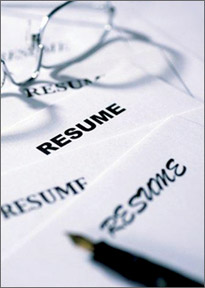How to write a resume
 A resume – sometimes called a ‘Curriculum Vitae’ or ‘CV’ - is a
summary of skills, education and work experience. A good resume
demonstrates how skills and abilities match up with the requirements of
a job. A resume should never be too long, if it is it probably won’t get
read at all. It is not an exhaustive list. The best resumes are usually
no longer than one or two pages. A resume – sometimes called a ‘Curriculum Vitae’ or ‘CV’ - is a
summary of skills, education and work experience. A good resume
demonstrates how skills and abilities match up with the requirements of
a job. A resume should never be too long, if it is it probably won’t get
read at all. It is not an exhaustive list. The best resumes are usually
no longer than one or two pages.
A resume should differ with every job application so that it lists
the skills and experiences that are most relevant to the job applied
for. A tailored resume will be much more successful than a generic one,
even though it means more preparation.
While things like academic record and work experience are typical
ways to show how suited you are to a particular job, these are not the
only things to be included. There are other ways to demonstrate that you
are the right person for the job, including:
Youth Central
Personal traits - an honest worker, enjoy being part of a big team
Strengths - things you’re good at or enjoy
Experiences - volunteering or extracurricular activities
Key responsibilities and achievements - any awards or recognition
received
The structure of the resume will vary depending on work experience
and education and training background. A resume usually sets out
information in reverse order. Most recent work experience and study
details should be first on the list.
Here’s a brief rundown on the essentials.
Personal details
Full name and contact details including address, telephone number(s)
and email address.
Education and training
A summary of education and training history, starting with most
recent studies. Make sure to include all training that is relevant to
the job.
Employment history
Start with most recent work history and work backwards
chronologically, listing the name of the employer, job title, the period
of time worked and responsibilities, tasks and achievements. Make sure
to include everything that is relevant.
Skills and abilities
A list of the things you are good at. These can be general skills or
skills specific to a particular job. List them under broad headings such
as ‘Communication’ and ‘Teamwork’.
Career objective (optional)
Tell the employer what type of job you want to end up with; this
shows that you have given thought to your future career.
Interests (optional)
A list of hobbies and interests; this gives employers more
information about you and also shows other areas of life where you have
gained experience such as teamwork and commitment.
Referees
List people who can talk about how good a worker you are. Make sure
you get their permission before including them on your resume. List
their name, company name occupation, and contact details.
Resume checklist
After you’ve written your resume, and before sending it, go through
this checklist:
Proofreading - Make sure there are no spelling mistakes, typos or
grammatical errors.
Tailoring - Make sure everything shows how well-suited you are for
the job.
Presentation - Make sure the resume is well laid out, easy to read
and printed on clean, white paper in a standard font (like Times New
Roman, Arial or Verdana) and at a standard size (10 or 12 point).
Detail - Make sure specific examples as to your achievements and
skills are provided. |



